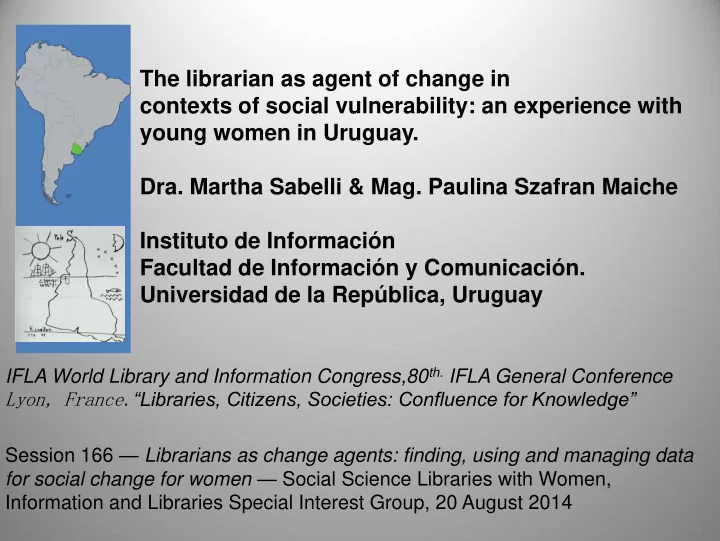

The librarian as agent of change in contexts of social vulnerability: an experience with young women in Uruguay. Dra. Martha Sabelli & Mag. Paulina Szafran Maiche Instituto de Información Facultad de Información y Comunicación. Universidad de la República, Uruguay IFLA World Library and Information Congress,80 th. IFLA General Conference Lyon, France. “Libraries, Citizens, Societies: Confluence for Knowledge” Session 166 — Librarians as change agents: finding, using and managing data for social change for women — Social Science Libraries with Women, Information and Libraries Special Interest Group, 20 August 2014
The project :“Towards the construction of information services for the community: a study of access to and use of information by women in unfavorable environments (Zone 9 of Montevideo)” supported by the University of the Republic’s CSIC (Sector Commission for Scientific Research) : 2008-2010 researc rch h team: LIS teachers s and researche hers, s, sociologi gists ts
The project is focuses : on the obstacles, barriers and facilitators to access, use and appropriation of information by citizens, especially young women in poor or destitute conditions; on the informational and digital divide
YOUNG WOMEN AND ADOLESCENTS IN SOCIAL LOCAL SOCIAL VULNERABILITY SERVICES M E D I A T O R S RESOURCES – PROCESS-FLOW OF INFORMATION Copyrigjt rigjt Martha ha Sabelli elli
The research strategy : an interdisciplinary team that worked with social actors from diverse organizations in the area (centers working closely with the community, e.g.: healthcare centers, youth clubs, education centers, libraries, telecenters, mostly belonging to the "Red Camino Nordeste" ) as well as with the women themselves.
The research strategy was designed through qualitat ativ ive methods: methods: in in-depth th interview ews, s, focus groups, workshops ps. 1. At the beginning of our research, 22 in depth interviews to qualified informants selected among social mediators. 2. 101 in-depth interviews with young women and adolescents users of services in the area.
3. Analysis of 167 documents and data produced for the community (billboards, posters, leaflets, newsletters ) 4. Two focus groups: a) young mothers in a Child and Family Care Centre – CAIF b) teenagers in one aula comunitaria (Community Classroom).
5. 6 interviews to people in charge of libraries, cyber cafes and free telecentres. 6. 8 in-depth interviews to mediators as information users (user study). 7. Focus group of mediators at the end of the research project.
Conclusions and proposals The investigation presented is the first one held in our country on the information needs of disadvantaged sectors, and specifically on young women and adolescents; New social policies aimed at these sectors have appeared in the last ten years.
promotion of access to ICTs by children and young people in public education; this is not accompanied by policies and actions aimed at library and information services for citizens; research showed the difference between young and adolescents – mothers and not mothers.
women are not aware of the resources and proposals aimed at them, with the exception of healthcare, being the polyclinics the services they are more acquainted with; the main subjects of such activities are related to maternity and / or domestic violence, with an emphasis on the traditional roles of women;
recreation is limited; women demand visual information, which must be concrete and of easy access; . the selection of sources is guided by the attribute of reliability; family context appears as a reference.
information needs are essentially related to healthcare issues, support related to school tasks and administrative procedures; information is then perceived by the participants: - as a “bridge” between the private sphere and the public one; - promoting insertion from outside family background;
- generating a favorable environment for labour insertion; - facilitating access to training and to the development of productive skills; - information to be able to express themselves; - claim for their rights, know where to go and where to study.
adolescents who are not mothers: information becomes necessary in the case of those issues and situations which are not dialogued within the family, i.e. «things about the life of women». are generally associated to domestic violence and to «the men» and male chauvinism.
To conclude we believe that this research - contributes to encourage public and social policies focused on the needs of citizens living in poverty information and embedded in contexts of vulnerability; - the creation and redefinition of public libraries in their areas as their "spaces”;
- show the possibility and opportunity to design and develop local information resources in the most disadvantaged areas; - the support for librarians as agents of change committed to the social role of our profession, it is an unavoidable debt in developing countries.
Publications generated by the research: • Sabelli, M. 2012, Information behavior among young women in vulnerable contexts and social inclusion: the role of social mediators, Information Researh 17(4) [Available at http://InformationR.net/ir/17-4/paper545.html] • Sabelli, M. & Rodríguez Lopater, V., comp. 2012, La información y las jóvenes en contextos desfavorables: construyendo puentes para la inclusión social desde la investigación, Udelar. CSIC, Montevideo. • Sabelli, M., Rodríguez Lopater, V., Szafran Maiche, P. & Bercovich, I. 2012, ‘Las brechas informativas y digitales de las mujeres jóvenes y adolescentes en situación vulnerable’, Laboratorio barrial de experiencia, Programa Integral Metropolitano, CSEAM, Montevideo [Available at http://www.extension.edu.uy/sites/extension.edu.uy /files/laboratorio barrial_de_experiencias.pdf ] Thank you very much! martha.sabelli@fic.edu.uy paulina.szafran@fic.edu.uy
Recommend
More recommend